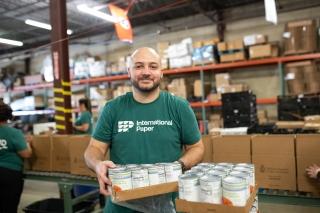International Paper takes action to address period poverty
Originally published at afandpa.org on November 17, 2022
Across the globe, more than 500 million women and girls are affected by period poverty. This is the lack of access to adequate menstrual health management supplies like pads and tampons. While it’s easy to imagine this issue in developing countries, millions of women and girls in the United States deal with the issue every day.
“Until I was aware of the extent of this issue, I thought it was a concern in developing countries, but the reality is that women and girls in our own backyard lack access to the products that they need,” said Dr. Alissa Campbell Shaw, senior manager, Global Corporate Social Responsibility and Community Engagement, International Paper.
Approximately 3.5 million girls in the U.S. have missed school due to lack of access to period products1. Not having access to period products impacts academic performance. It also has negative social and emotional impacts2.
“As a woman and a mother to daughters, this issue really hit home! Young women are missing school and feeling ashamed because of a natural and normal function in their bodies,” said Dr. Shaw. “If they miss one week of school every month of the school year, then they can easily fall behind in their academics, which has long-term implications for their future.”
To help address this issue, International Paper is collaborating with their employees and industry partners to supply essential products to communities. In her role, Dr. Shaw helps make this collaboration possible.
“I creatively use all the resources that International Paper has available, such as our employee volunteers, our products and funding, to help the company make a positive impact in the world,” said Dr. Shaw. “My team empowers our employees to have an impact in their communities and brings awareness to issues such as hunger, illiteracy, and access to health supplies. We also support people who need help the most by providing basic needs.”
International Paper's efforts to fight period poverty won a 2022 AF&PA Sustainability Award in Diversity, Equity and Inclusion. In 2021, 13 International Paper facilities hosted volunteer packing events with employees to provide nearly 5,000 period care kits to their communities. This year, they’re set to distribute 5 times that number with support from 45 facilities across the U.S. and around the world.
“I am continually in awe of the care and enthusiasm of our employees around the globe to give back to their communities. Their generosity of spirit inspires me,” said Dr. Shaw.
International Paper is a leading global supplier of renewable fiber-based products including pulp. Pulp is a renewable material used in essential products around the world including diapers, tissue and other personal hygiene products that promote health and wellness. IP’s pulp is used to make more than 100 billion feminine care pads each year that are distributed globally.
“As a leading producer of pulp, we are dedicated to using our products to improve the lives of the communities where our team members live and work,” said Dr. Shaw. “Partnering with our customers to alleviate period poverty is rooted in the belief that all girls and women should have access the products we create every day.”
“At International Paper, we are working to build a better future for people, the planet and our company,” said Dr. Shaw. “I am inspired by the company’s Vision 2030 goals. By working together, we will improve the lives of 100 million people by 2030!”
Dr. Shaw said it's easy for people to take action to address period poverty:
- Learn more and spread the word to others to help #EndPeriodPoverty
- Volunteer to conduct a product supply drive
- Help pack period care supplies for distribution
- Support legislation in the U.S. that helps provide access to menstrual care products
As a leading producer of pulp, we are dedicated to using our products to improve the lives of the communities where our team members live and work.
Read more at the American Forest & Paper Association.
1. 1000 U.S. females, 16-24 y.o Research Now ‘17 & U.S. 2016 Census
2. 2551 U.S. women, 16-29 y.o., MSL ‘19


